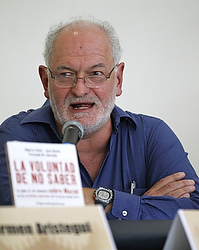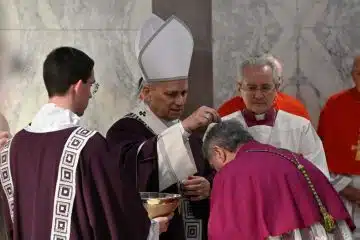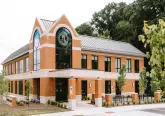Father Maciel’s legacy – good and bad – lives on in Mexico
March 26, 2012
By David Agren, Catholic News Service
LEON, Mexico (CNS) – Priests from the Legionaries of Christ celebrate Mass every Sunday at the cathedral in this conservative Catholic city, which Pope Benedict XVI visited March 23-26.

Youths belonging to the Legionaries’ lay movement, Regnum Christi, planned to participate in welcoming the pope to Mexico and volunteer at the papal Mass in neighboring Silao. Businessmen who donated heavily to Legionaries’ schools for children in impoverished barrios also attended the Mass.
Absent from the papal itinerary in Guanajuato state: victims abused by the founder of the Legionaries, Father Marcial Maciel Degollado.
Father Maciel died in 2008, having been told by Pope Benedict to stop practicing his ministry in public and live a life of prayer and penance.
The order he founded in 1941 was placed under new leadership by the Vatican in 2010 after an apostolic visitation. It was to be founded anew with a different charism, in repudiation of Father Maciel and his life’s work, which is marred by accusations of him sexually abusing seminarians and fathering children.
The priest’s legacy and influence lives on in Mexico, serving as reminders of the church’s shortcomings dealing with the victims of predatory priests and its seeming unwillingness to denounce an enduring culture of entitlement, impunity and privilege in the economic elite that Father Maciel courted.
Victims of the Mexican priest attempted to make their voices heard during the papal visit, which came as the Legionaries of Christ are going through a period of organizational uncertainty and profound public skepticism.
“We love our church,” Jose Barba, professor at the Autonomous Technological Institute of Mexico and an early accuser of Father Maciel, told Catholic News Service in a brief email March 23.
“We only fight against injustice and misapprehension when apprehension and justice are due,” added Barba, co-author of a new book, “The Will Not to Know,” on the Legionaries’ scandal and the Vatican’s alleged inaction as allegations mounted against Father Maciel.
The Vatican spokesman, Jesuit Father Federico Lombardi, said prior to the pope’s departure that Pope Benedict would not meet with Father Maciel’s victims because the Mexican bishops’ conference did not request it. He repeated that position March 24 in Leon.
Church observers, the Survivors Network of Those Abused by Priests and the authors of “The Will Not to Know” found the lack of a goodwill gesture from Pope Benedict to the victims of abuse baffling. The pontiff, they said, met with victims during past trips to the United States, Australia, Malta, England and Germany.
“It seems that Pope Benedict XVI is keeping the same silence that the Mexican bishops’ conference itself has maintained throughout … the Maciel case,” said a statement issued March 24 by the authors of “The Will Not to Know.”
Father Manuel Corral, spokesman for the Mexican bishops’ conference, said the conference would issue a statement on the matter at a later date.
“The Will Not to Know,” written by Barba; a former priest, Alberto Athie; and psychoanalyst Fernando Gonzalez, was presented March 24 in Leon. The presentation drew enormous press attention during the papal visit, reflecting the lasting impact of the Father Maciel scandal and the willingness of media members to now take issue with a group previously considered off-limits for scrutiny and investigations.
“What’s being said here isn’t a lie,” Bishop Raul Vera Lopez of Saltillo told Catholic News Service.
“This reflects a lot of pain,” he added, pointing at a copy of the book and saying he knew many of Father Maciel’s victims, whom he called “damaged” by Father Maciel’s actions.
The book, which the authors said is based on previously secret Vatican documents from 1944 to 2001, alleges the Vatican knew details of Father Maciel’s sins for decades, but failed to take action.
The allegations in the book appear to contradict comments from Pope Benedict published in his 2010 book, “Light of the World: The Pope, the Church and the Signs of the Times,” in which he called Father Maciel “a mysterious figure” and “a false prophet.” The pope told German journalist Peter Seewald: “Unfortunately, we addressed these things very slowly and late. Somehow, they were concealed very well and only around 2000 did we have any concrete clues.”
Pope Benedict was the one who ultimately took action against Father Maciel.
The relationship between his predecessor, Blessed John Paul II, and Father Maciel was considered close. Father Maciel moved easily through the Vatican, Bishop Vera said, adding, “He had … a skill for handling money.”
Barba attributed Father Maciel’s favor to charm and charisma.
During a 2010 interview with Catholic News Service, Barba also noted that Father Maciel and Blessed John Paul shared similar histories of church persecution in their home countries.
Papal biographer George Weigel has said Father Maciel convinced then-Mexican President Jose Lopez Portillo to meet Blessed John Paul when he arrived in Mexico for the first of his five trips to the country in 1979.
Father Maciel was born in Cotija. St. Rafael Guizar Valencia was his great-uncle.
Father Maciel later founded the Legionaries of Christ in the southern part of Mexico City, where, according to a 2009 story in the magazine Milenio Semanal, he focused his efforts on serving a group largely ignored by existing orders of the day: the rich. He opened elite academies and universities along with schools for the poor known as “Mano Amiga,” or Helping Hand.
Many joined his order out of conviction, but Milenio Semanal alleged others became affiliated with the Legionaries out of the need to make social connections with the rich and powerful – something important in a country where relationships can matter as much as talent and ability.
To this day, this reputation persists, leading in large part to the onslaught of such unfavorable media attention, says political science professor Federico Estevez of the Autonomous Technological Institute of Mexico.
“It’s just a Tiger Woods story with an institution,” he said in 2010.
It remains to be seen what becomes of the Legionaries and if it truly is an institution based on Christ, not centered on the cult of Father Maciel, as Barba has alleged.
“If the bases aren’t corrected – those that Father Maciel constructed – this is going to continue producing not very good results,” Bishop Vera said.
Father Jose de Jesus Aguilar, director of TV and radio for the Archdiocese of Mexico City, cautioned against disparaging the group, many of whose members, he said, lead proper Christian lives.
“If Father Maciel never had been known, it would be another small group among the rest of them,” he said. “They’re a group impacted by a scandal,” not the actions of its members.













